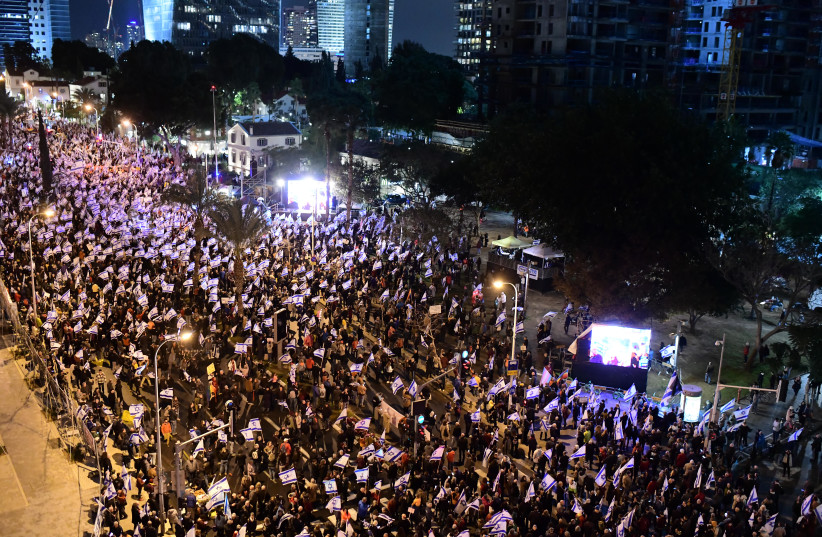by Eliav Breuer
Restricting power is a Jewish value, not just democratic, former police commissioner Alsheikh said.
 |
Israelis protest against the current Israeli government and their planned reforms, in Tel Aviv, on January 28, 2023
(photo credit: TOMER NEUBERG/FLASH90)
|
Well over 100,000 Israelis demonstrated for the fifth straight week against the government's proposed reforms of Israel's judicial reform in dozens of locations throughout the country, including in Haifa, Beersheba, Jerusalem, Kfar Saba, Modi'in, and two locations in Tel Aviv, at Habima Square and on Kaplan Street.
Protests were also held on Saturday in Paris outside of the hotel that Prime Minister Benjamin Netanyahu and his wife were staying in, and in London outside of the Israeli embassy.
Opposition leader MK Yair Lapid attended the demonstration in Haifa.
"These people in Haifa, Beersheba, Jerusalem and Tel Aviv, came to say that they do not want to live in a country in which people who work are less important than people who don't, and people who serve in the army are less important than those who do, and people who do not abide by the law are more important than people who do," Lapid said.
"These people are trying to save their country, and we come to protest with them because we will not let this happen. We will fight in the streets, we will fight in the Knesset, we will fight in the courts. We will save our country because we are not willing to live in a non-democratic state," Lapid said.
Former police chief speaks out against judicial reform
Former Israel Police commissioner Roni Alsheikh was the central speaker at the Habima protest. Alsheikh led the police during its investigation and eventual recommendation to indict Netanyahu for bribery, fraud and breach of trust, and has been ostracized by many of Netanyahu's supporters since.
Alsheikh stressed in his speech that he was fighting the reform precisely because he was religious and wore a skullcap.
He called on his fellow religious Zionists and rabbis, who told him in private that they opposed the reforms even though they voted for some of the coalition parties, to speak out, despite the attacks that they would have to endure.
Alsheikh said that as a religious Zionist he was embarrassed that the reform was happening in a Jewish state. Restraining power is a Jewish value, Alsheikh argued, quoting biblical stories of Kings who took upon themselves too much power.
The protests came after President Isaac Herzog offered a compromise whereby the legislative proceedings in the Knesset will be frozen for two weeks, during which the president will host representatives of the supporters and detractors of the reform in an attempt to reach a compromise.
Labor leader MK Merav Michaeli, former Meretz chairman Zehava Galon and a number of leaders of the protests such as Movement for Quality Government in Israel lawyer Eliad Shraga refused out of hand, with Shraga quoting former British prime minister Winston Churchill's famous quip that should not negotiate "with its head in the tiger's maw."
High Court Chief Justice Esther Hayut reportedly on condition that the legislation in the Knesset would indeed be frozen, but Justice Minister Yariv Levin reportedly refused.
However, some politicians from the center-right National Unity opposition party supported the president's initiative, including former justice minister, MK Gideon Sa'ar.
Eliav Breuer
Source: https://www.jpost.com/breaking-news/article-730592
No comments:
Post a Comment